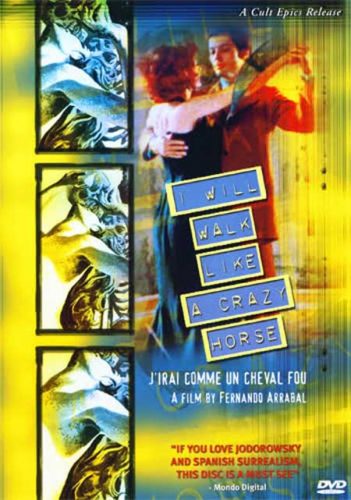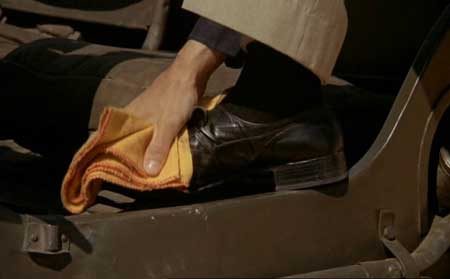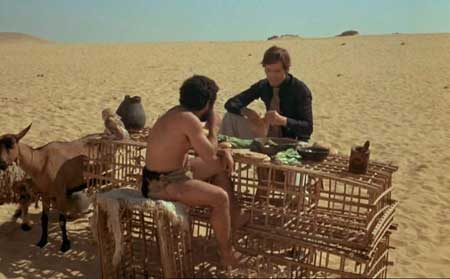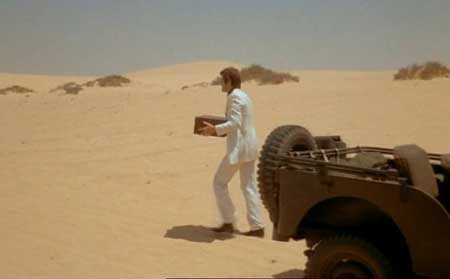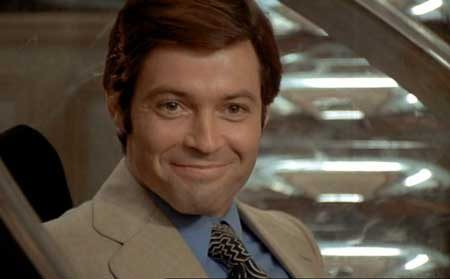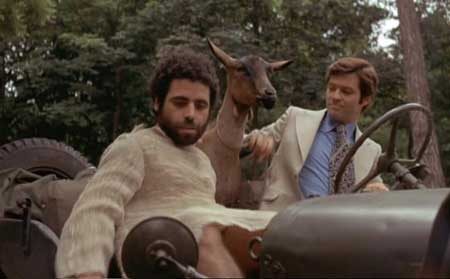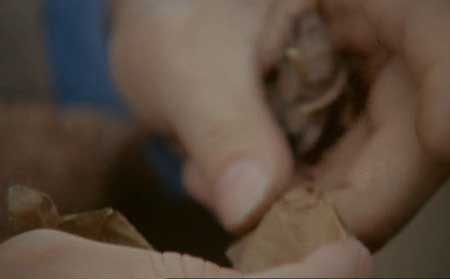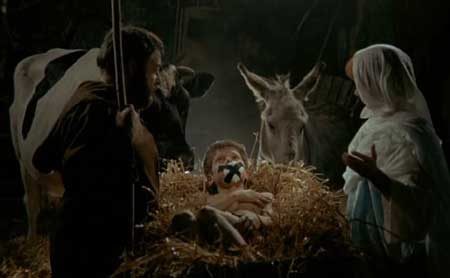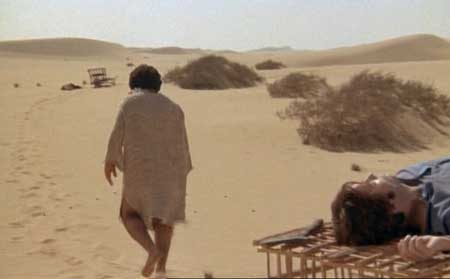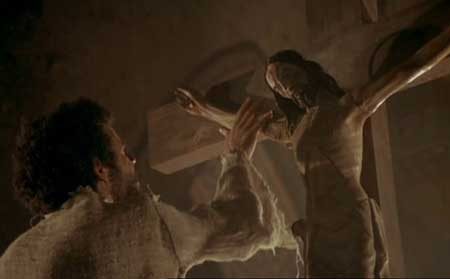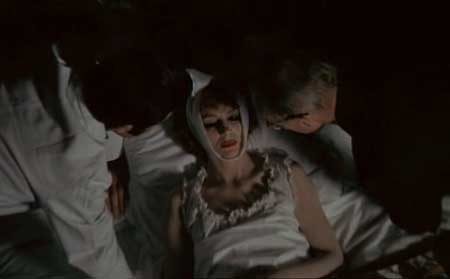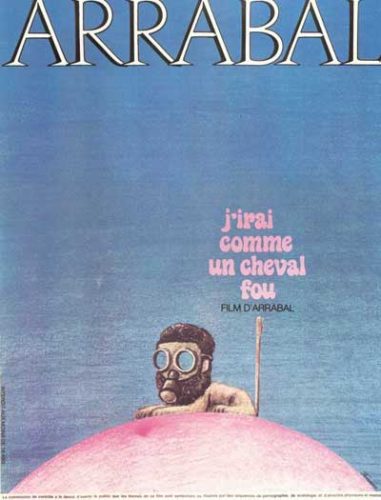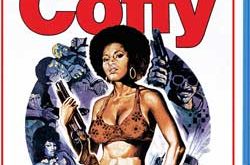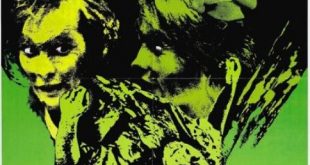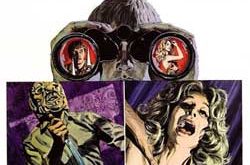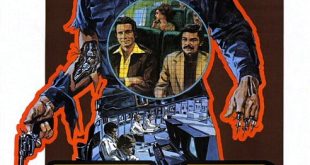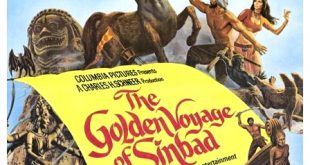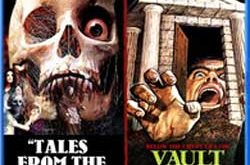SYNOPSIS:
Running away from the police, Aden goes to the desert where he meets an uncivilized man who has a special link with Mother-Earth. He ends up by convincing the hermit to come along with him into another desert… the big town!
REVIEW:
Fernando Arrabal’s bizarre, Freudian, surrealist nightmare, I Will Walk Like a Crazy Horse, is a movie as much about murder and mystery as it is about nature versus technology. When Madame Rey (Emmanuelle Riva, from Michael Haneke’s Amour) is found dead, police begin investigating and find clues pointing back toward her son, Aden (George Shannon, a TV actor in the 60s, 70s, and 80s who appeared in anything from General Hospital to Kojak to Cheers), who immediately takes off for the desert. It is here that he meets Marvel (Hachemi Marzouk), a simple man who lives off the earth without the benefits of technology or civilization. Marvel, who may or may not have mystical powers, takes Aden in and feeds him, and soon Aden decides to try to repay the favor by showing Marvel the big city (Paris).
The film making style of Arrabal is a surrealist approach that is heavy with symbolism and is far from linear in its storytelling methods. Don’t let this scare you off, because what this translates into here is a film with lots of shocking visuals that is much more fascinating than it is confusing. Sure, you might find yourself needing to give I Will Walk Like a Crazy Horse a second, or even third, viewing in order to better understand the story, but watching a good film multiple times is hardly a punishment. I’ve even seen Arrabal called “the poor man’s Jodorowsky,” and while I don’t necessarily agree that they are on different levels (one is not better or worse than the other, they are simply different filmmakers with different styles), I think the initial comparison to the Chilean director should be seen as both a compliment to Arrabal’s work as well as a recommendation.
I Will Walk Like a Crazy Horse focuses primarily on the journeys of Aden and Marvel. Through flashbacks to his childhood, we learn of Aden’s bizarre home life and relationship with his mother – the random men in her life, her insults toward her son, his medical issues, and their borderline (or maybe it’s well over the line) inappropriate closeness. As the duo travel along, we also learn of Aden’s attitude and rough behavior toward women, something that may or may not stem from his childhood. Marvel, on the other hand, is a strange character, for sure, but one that seems to be very much in touch with nature and the animal kingdom. When we first meet him, he is eating sand and goat feces, and he has a bag full of carefully wrapped toe nail clippings, one for each year of his life, which Aden counts to an impossibly high number. Once he sees the city, he is both terrified and amazed, horrified to see that people kill and eat the animals that have always been his friends, and unhappy with his fancy, top of the line apartment until he covers a room with dirt and starts a garden – some of Marvel’s arcs remind me a bit of John, “the savage,” from Brave New World.
As I mentioned, the film is full of juxtaposed images and symbolic scenes, meant no doubt to shock the audience as much as to more fully tell the story. Possibly the best example of this, to give an idea of what we’re talking about here, happens right near the beginning. We have seen on the news that Madame Rey has been found dead and that her son has disappeared and, while not yet being accused of the murder, is wanted for questioning. At the same time, we see Aden driving his jeep into the barren desert.
All of this is really happening in the story, of course. But against these scenes, we have images of a manger, much like that of the story of Jesus, but here the “Jesus” figure has his mouth taped closed and needles are being stabbed into his genitalia. When Aden’s mother’s voice is heard in the background, the scene cuts quickly to a woman having her tongue nailed to a board. And this is just the beginning of the trip, one that never lets up for the full 100 minute running time, all the way to the end when we reach the completely unexpected final scene.
Throughout I Will Walk Like a Crazy Horse, we are in the characters’ heads almost as much as we are following their physical journeys. At the same time we are also in the director’s head as we watch his technique and style flow across our screens. It is for these reasons, just a few among many, that I am happy and excited to have become acquainted with the work of Fernando Arrabal and do not hesitate to recommend this to film lovers of all kinds.
Special Features:
- New Digital Transfer
- Exclusive 15 minute Interview with director Fernando Arrabal
- Lobbycard gallery
- Theatrical trailer • Scene selection
- 6-Page Liner Notes
- Widescreen – Enhanced for 16×9
Technical Specs
France / 1973 / 90 Minutes / French Language with optional English Subtitles / Dolby Digital 2.0 Stereo / Aspect Ratio 1.85:1 / Color
I Will Walk Like a Crazy Horse (1973) is now available on DVD per Cult Epics
 Horror News | HNN Official Site | Horror Movies,Trailers, Reviews
Horror News | HNN Official Site | Horror Movies,Trailers, Reviews
